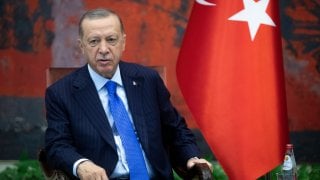How Turkey Outplayed Egypt and the U.S. In The Horn Of Africa
Ankara’s recent geopolitical gains go beyond just Syria.
Turkey has mediated an agreement between Ethiopia and Somalia, ending nearly a decade-long rivalry between the two African nations. While the deal is a welcome development for regional stability, Turkey’s mediation complicates Egypt’s regional strategy, as Cairo remains actively engaged in this conflict.
Turkish President Recep Tayyip Erdogan hailed the deal as a “historic agreement.” It sees Ethiopia and Somalia agreeing “to leave behind differences of opinion and contentious issues.” The agreement would grant Ethiopia “reliable, safe and sustainable” sea access under Somali sovereignty, implicitly signaling that Addis Ababa will rescind its recognition of the de facto state of Somaliland.
Tensions peaked in January when landlocked Ethiopia reportedly struck a deal with Somaliland to lease a port and military base in exchange for recognition. While Addis Ababa never confirmed the agreement, Somalia saw the deal as a violation of its sovereignty. Egypt, embroiled in its own dispute with Ethiopia over Nile water resources, supported Somalia as part of its broader strategy to pressure Ethiopia.
By August, Egypt had reportedly deployed 10,000 troops and sent two weapons shipments to Mogadishu. Addis Ababa expressed concern at the arrival of the troops and weapons, saying it could exacerbate the security situation in Somalia and that weapons could fall into the hands of Islamist groups like Al Shabab.
In an October 18 interview, Egyptian foreign minister Badr Abdelatty reaffirmed Cairo’s commitment to Somalia’s security following Ethiopia’s completion of the fifth phase of filling the Grand Ethiopian Renaissance Dam (GERD). Abdelatty also disclosed that he had reiterated his objection to Ethiopia’s unilateral action in a letter to the United National Security Council. Addis Ababa responded with its own letter to the UNSC, accusing Egypt of making repeated threats of force. In November, Egypt sent a third weapons shipment to Somalia.
Meanwhile, relations between Egypt and Turkey have been cautiously warming. In September, Erdogan welcomed Egyptian president Abdel Fattah al-Sisi to Ankara, marking Sisi’s first visit to Turkey. Relations between the two nations had been less than warm since 2013 when Erdogan condemned Sisi’s military coup against Mohammed Morsi, Egypt’s then-Muslim Brotherhood leader. Erdogan’s fiery rhetoric, including calling Sisi a “tyrant,” deepened the rift.
This dynamic began to shift in 2020 when Erdogan reassessed his strategy. Mending ties with Turkey could neutralize Egypt’s regional threats and boost its struggling economy. For Erdogan, rebuilding ties with Cairo offers a chance to reverse his failed isolationist policies, reassert Turkey’s regional role, and seek inclusion in the East Mediterranean Gas Forum.
Through his mediation with Somalia and Ethiopia, Erdogan dealt a blow to Egyptian influence in the region and its rivalry with Ethiopia. With its leverage disappearing overnight, Egypt must recalibrate its strategy. While the warming ties between Cairo and Ankara might offer some alternatives, Turkey’s success in this instance underscores its ability to outpace Egypt on the regional stage.
This deal demonstrates Ankara’s growing assertiveness and influence on the world stage. Erdogan has made it clear that he wishes to expand Turkey’s footprint in Africa and beyond, even into areas of traditional U.S. influence. It’s a reminder that Turkey is actively challenging traditional power dynamics, often at the expense of the U.S. and its allies.
This is not the only instance of Turkey dominating the headlines. Turkey has become more forceful in the wider Middle East, particularly in Syria. The recent rebel uprising that brought down the Assad regime is widely attributed to Ankara green-lighting Hayat Tahrir al-Sham and the Syrian National Army’s military campaign to Damascus, which caught the entire world by surprise and showed Russia and Iran’s inability to bolster their ally. Turkey is interested in asserting its will in all areas where Washington is seemingly absent or is too distracted by the transition process between the Biden and Trump administrations.
For the United States, Turkey’s maneuver should serve as a wake-up call. While the Horn of Africa is sometimes sidelined in U.S. foreign policy, the region is strategically critical for countering instability, curbing extremism, and securing key maritime routes in the world’s fastest-growing continent. Turkey’s ability to broker a deal in Washington’s absence highlights how power vacuums can be exploited.
Without a regional presence, Washington risks conceding influence to powers with divergent goals. Effective mediation of the Nile dispute between Egypt and Ethiopia could reestablish American credibility and stabilize the Horn of Africa. Failure to do so could deepen fractures among U.S. allies, weaken its influence in an increasingly competitive global landscape—or worse, hand Ankara yet another opportunity to further strengthen its position.
Sinan Ciddi is a senior fellow at the Foundation for Defense of Democracies and an associate professor of national security studies at Marine Corps University. Follow him on X @SinanCiddi.
Mariam Wahba is a research analyst at the FDD. Follow her on X @themariamwahba.
Image: Sasa Dzambic Photography / Shutterstock.com.

